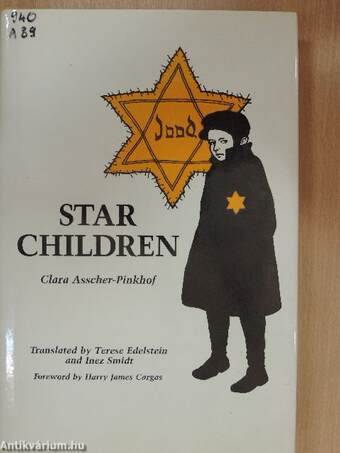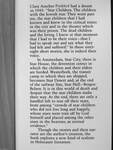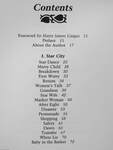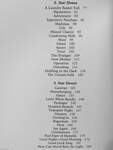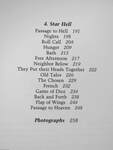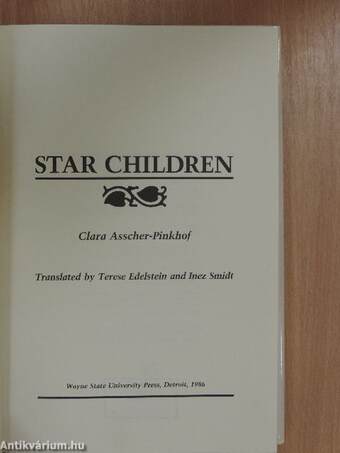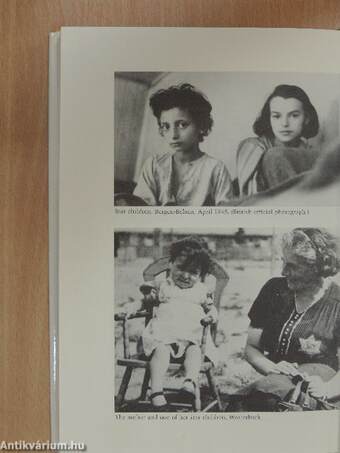1.118.362
kiadvánnyal nyújtjuk Magyarország legnagyobb antikvár könyv-kínálatát
Star Children
| Kiadó: | Wayne State University Press |
|---|---|
| Kiadás helye: | Detroit |
| Kiadás éve: | |
| Kötés típusa: | Vászon |
| Oldalszám: | 258 oldal |
| Sorozatcím: | |
| Kötetszám: | |
| Nyelv: | Angol |
| Méret: | 24 cm x 16 cm |
| ISBN: | 0-8143-1846-0 |
| Megjegyzés: | Fekete-fehér fotókkal. |
naponta értesítjük a beérkező friss
kiadványokról
naponta értesítjük a beérkező friss
kiadványokról
Fülszöveg
Clara Asscher-Pinkhof had a dream
in 1943: "Star Children. The children
with the Jewish star. They went past
me, the star children that I had
known and knew in the critical times
in the city and in the theater which
was their prison. The dead children
and the living. I knew at that moment
that I had to be their voice—that I
had to speak out and say what they
had felt and suffered." In these sixty-
eight short stories, she is indeed their
voice.
In Amsterdam, Star City, there is
Star House, the detention center in
which the children and their elders
are herded. Westerbork, the transit
camp to which they are shipped,
becomes Star Desert and, at the end
of the railway line, Star Hell—Bergen-
Belsen. It is in this world of death and
despair that the star children make
their way At the end, there are only a
handful left to tear off their stars,
from among "crowds of star children
who did not live long and happily,
whose stars were torn off by God
himself and... Tovább
Fülszöveg
Clara Asscher-Pinkhof had a dream
in 1943: "Star Children. The children
with the Jewish star. They went past
me, the star children that I had
known and knew in the critical times
in the city and in the theater which
was their prison. The dead children
and the living. I knew at that moment
that I had to be their voice—that I
had to speak out and say what they
had felt and suffered." In these sixty-
eight short stories, she is indeed their
voice.
In Amsterdam, Star City, there is
Star House, the detention center in
which the children and their elders
are herded. Westerbork, the transit
camp to which they are shipped,
becomes Star Desert and, at the end
of the railway line, Star Hell—Bergen-
Belsen. It is in this world of death and
despair that the star children make
their way At the end, there are only a
handful left to tear off their stars,
from among "crowds of star children
who did not live long and happily,
whose stars were torn off by God
himself and placed among the other
stars in the heavens, as eternal
evidence."
Though the stories and their nar-
rator are the author's creation, the
book explores a new kind of realism
in Holocaust literature. Vissza
Témakörök
- Idegennyelv > Idegennyelvű könyvek > Angol > Szépirodalom > Regény, novella, elbeszélés
- Szépirodalom > Regény, novella, elbeszélés > Az író származása szerint > Európa > Hollandia
- Szépirodalom > Regény, novella, elbeszélés > Tartalom szerint > Történelmi regények > Koncentrációs táborok, holokauszt
- Szépirodalom > Regény, novella, elbeszélés > Tartalom szerint > Gyerektörténetek
- Szépirodalom > Regény, novella, elbeszélés > Tartalom szerint > Társadalmi csoportok > Kisebbségek > Zsidóság
- Szépirodalom > Regény, novella, elbeszélés > Tartalom szerint > Összegyűjtött elbeszélések


